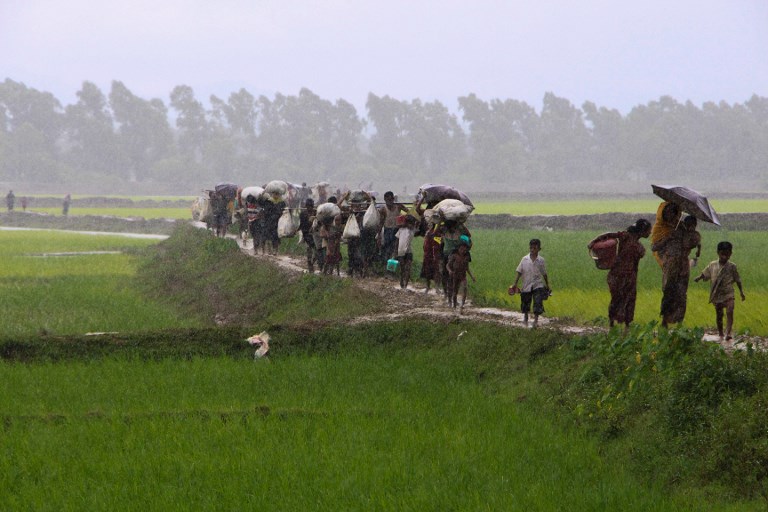More than 600,000 Rohingya refugees have fled Myanmar for Bangladesh since violence erupted in northern Rakhine in August, a UN report said Sunday.
The grim new landmark comes as authorities in Bangladesh were bracing for another possible surge in Rohingya arrivals, with thousands from the Muslim minority believed to be stranded along the border waiting to cross.
Rohingya refugees have headed for Bangladesh in huge numbers after militant attacks on Myanmar security forces in Rakhine state sparked a major army crackdown on the community likened to ethnic cleansing by the UN.
Now the UN-led Inter-Sector Coordination Group (ISCG), which is directing the humanitarian effort, has said an estimated 603,000 refugees from Rakhine have crossed the border into Bangladesh since August 25.
“Cross border movement of over 14,000 newly arrived refugees has been verified in the past week,” the ISCG report said.
Bangladesh border guards are also concerned the relaxation later Sunday of a temporary ban on fishing in the Bay of Bengal could see a surge in people-smuggling along the coast as unscrupulous captains return to the seas.
Rohingya refugees already in Bangladesh have received videos from families across the border showing thousands of displaced Muslims massing near crossing points, waiting for an opportunity to cross.
“We have seen some videos sent by people across the border. There are many gathered there. The number could be big,” Border Guard Bangladesh commander Lieutenant Colonel S.M. Ariful Islam told AFP, without giving an estimate.
Around 10,000 refugees were left stranded in no man’s land near Anjumanpara village for three days last week after being prevented from crossing into Bangladesh. They were finally permitted by authorities to enter Thursday.
The influx has slowed since then, with charities and officials reporting about 200 people crossing the Naf River dividing the two countries.
“(But) those that came told us thousands were still stranded on the other side of Naf,” Jashim Uddin, a volunteer for the International Organisation for Migration, told AFP.
Another border guard told AFP an estimated 10-15,000 refugees were heading to Anjumanpara but had been pushed back.
“We heard from their relatives that the Myanmar army has stopped them from heading to the border,” said a Border Guard spokesman, Iqbal Ahmed.
Refugees arriving Sunday described violence in their villages in Rakhine and food shortages that had forced countless people to flee.
“We hardly had any food for the last 10-15 days. They torched our home. We did not have any choice but to leave,” Yasmin, who goes by one name, told AFP at the coastal village of Shah Porir Dwip.
Authorities meanwhile are on high alert for fishermen seeking to ferry refugees to Bangladesh via the open sea as the temporary fishing ban expires later Sunday.
“It is risky, but you can make a lot of money ferrying Rohingya to Bangladesh,” said local fisherman Shawkat Hossain.





Reader Interactions